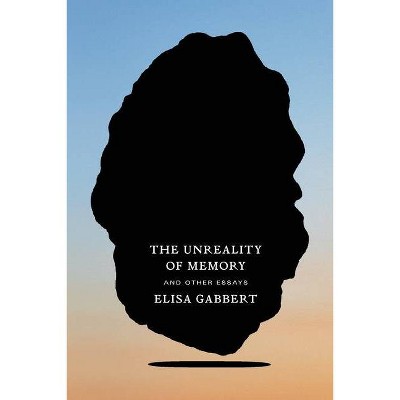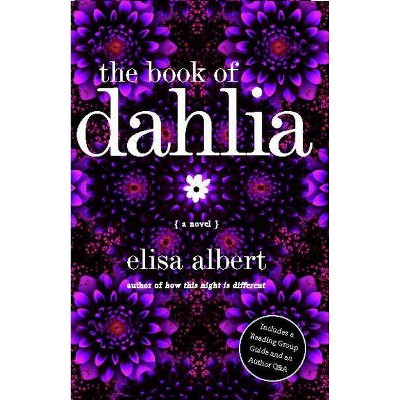The Unreality of Memory - by Elisa Gabbert (Paperback)

Similar Products
Products of same category from the store
AllProduct info
<p/><br></br><p><b> About the Book </b></p></br></br>"Poet and essayist Elisa Gabbert's The Unreality of Memory consists of a series of lyrical and deeply researched meditations on what our culture of catastrophe has done to public discourse and our own inner lives. In these tender and prophetic essays, she focuses in on our daily preoccupation and favorite pastime"--<p/><br></br><p><b> Book Synopsis </b></p></br></br><p><b>Terror, disaster, memory, selfhood, happiness . . . leave it to a poet to tackle the unthinkable so wisely and so wittily.* A literary guide to life in the pre-apocalypse, <i>The Unreality of Memory </i>collects profound and prophetic essays on the Internet age's media-saturated disaster coverage and our addiction to viewing and discussing the world's ills.</b> <p/>We stare at our phones. We keep multiple tabs open. Our chats and conversations are full of the phrase "Did you see?" The feeling that we're living in the worst of times seems to be intensifying, alongside a desire to know precisely how bad things have gotten--and each new catastrophe distracts us from the last. <p/><i>The Unreality of Memory</i> collects provocative, searching essays on disaster culture, climate anxiety, and our mounting collective sense of doom. In this new collection, acclaimed poet and essayist Elisa Gabbert explores our obsessions with disasters past and future, from the sinking of the <i>Titanic </i>to Chernobyl, from witch hunts to the plague. These deeply researched, prophetic meditations question how the world will end--if indeed it will--and why we can't stop fantasizing about it. <p/>Can we avoid repeating history? Can we understand our moment from inside the moment? With <i>The Unreality of Memory</i>, Gabbert offers a hauntingly perceptive analysis of our new ways of being and a means of reconciling ourselves to this unreal new world. <p/><b>A work of sheer brilliance, beauty and bravery." *--Andrew Sean Greer, author of <i>Less</i> </b></p><p/><br></br><p><b> Review Quotes </b></p></br></br><br><p><b>Finalist for the Colorado Book Award for Creative Nonfiction</b><br><b>HuffPost's 10 Best Books of 2020</b><br><b>Electric Literature's Favorite Nonfiction Books of 2020</b> <p/>"Gabbert draws <b>masterly</b> portraits of the precise, uncanny affects that govern our psychological relationship to calamity . . . Even more impressive is her skill at bending crisp, clear language into shapes that illustrate the shifting logic of the disastrous, keeping the reader oriented amid continual upheaval . . . <b>The essays often seem uncannily to anticipate circumstances that the author simply couldn't have known about: They have a clarity and prescience that imply a sort of distant, retrospective view, like postcards sent from the near future</b>." --<b>Alexandra Kleeman, <i>The New York Times</i></b> <p/>"<b>Nimble </b>. . . <b>Gabbert studies our atomized and vulnerable capacity for perception with whetted eloquence</b>: Her essays, <b>vigorous in their intellectual pursuit</b>, travel across vast and varied territory . . . but never at the expense of thematic cohesion. Cumulatively, <b> this work lays bare the intractable chasm between what we fear and what we understand</b>. How we look at disasters and how we commit them to memory reveal our fettered perception, and by extension, the fickle, mutable edges of our empathy." --<b>Rachel Vorona Cote, <i>The Nation</i></b> <p/>Gabbert's wide-ranging essays span history, scholarship, pop culture, and literature with both nuance and incisiveness. They're <b>the kind of essays that don't only teach you things, they leave you thinking harder and deeper </b>about what it means to live in this world. <b>--Lincoln Michel, <i>BOMB</i></b> <p/>"<b>Absolutely stunning</b> . . . [Gabbert] peers behind the curtains of mortality and time to explore the ways that memory and story either lull us into complacency about moral evil or allow us to embrace impending death . . . <i>The Unreality of Memory </i>is <b>a book for our times</b>." --<b>Henry L. Carrigan Jr., <i> BookPage</i></b> <p/>Elisa Gabbert's <i>The Unreality of Memory </i>is <b>one of those joyful books that send you to your notebook every page or so, desperate not to lose either the thought the author has deftly placed in your mind or the title of a work she has now compelled you to read.</b> The essays encompass sickness and trauma, anesthesia and memory, politics and political apathy, but owing to the force of Gabbert's attention, the book remains determinedly cohesive. Written before COVID-19 altered all our lives so irretrievably, it is also a work of uncanny prescience. <b>--Robin Jones, <i>The Paris Review </i>(staff pick)</b> <p/>Gabbert's essays feel <b>incredibly relevant</b> . . . In a culture where so many of us are hurting--spiritually, mentally, and physically--Gabbert's words invite us to feel our pain . . . Just as a massage leaves us feeling sore but also better, her work <b>challenges us to see our collective suffering as one in which we have some personal responsibility</b> for addressing. . . It is almost chilling to read certain sections of the book . . . Gabbert brings the problems to our attention, acknowledges she's in the same boat with us, and <b>quietly challenges us to respond</b>. <b>--</b><b>Lindsey Weishar, <i>Ploughshares</i></b> <p/><b>Searing . . . In shattering essays, Gabbert explores if and how and why certain threats register more than others, </b><b>and how even seemingly immutable facts are subject to spin from our imprecise recollections. </b>There's a chapter on pandemics, and yes, it is chilling. <b>--<i>Vulture</i></b> <p/><b>Gabbert is that most valuable thing, a poet who is good at research; her details convince, and her style inveigles.</b> Succeeding pieces about Chernobyl, the Challenger and Columbia explosions, the shocking 2016 election, and other examples all reinforce her point--including her rather detailed anticipation of a viral pandemic. <b>--Phil Christman, <i>Plough</i></b> <p/><b><i></i></b>Elisa Gabbert's essays are always worth reading. <b>--</b><i><b>LitHub</b><br></i><br>Deeply contemplative but accessible . . . Whatever the chosen topic, Gabbert's essays manage to be by turns <b>poetic, philosophical, and exhaustively researched. This is a superb collection.</b> <b>--<i>Publisher's Weekly</i></b> <p/>In her second collection of nonfiction, <b>poet Gabbert moves fluidly from disaster to dislocation to political upheaval, offering a kind of literary road map to our tumultuous era </b>. . . The idea here--as in all the essays in this nuanced book--is that consciousness is conditional, and we can understand ourselves only in pieces. <b>A fine collection from a poet who seems equally comfortable in prose.</b> <b>--<i>Kirkus (starred)</i></b> <p/>Provocative [and] searching . . . These <b>deeply researched, prophetic meditations question how the world will end</b>--if indeed it will--and why we can't stop fantasizing about it. <b>--<i>The Rumpus</i></b> <p/>If it seems that the world is falling apart, and you think you might be losing your mind, this book is here to reassure you: it is, and you are. <b>There can be no better companion in these bewildering times than the crystalline mind of Elisa Gabbert</b>; she delivers the bad news with the ardor of an aria and the rigor of a clinical trial. <b>--J. Robert Lennon, author of <i>Broken River </i></b> <p/>Amid impending disasters too vast even to be perceived, what can we do--cognitively, morally, and practically?<b> Gabbert, a tenacious researcher and a ruthless self-examiner, probes this ultimate abstraction in her essays, goes past wordless dread and comes up with enough reasoned consideration to lead us through</b>. Do you feel--and how can you not--as if your emotional endurance is exhausted by horrors already well underway? Then <b>you should read this book.</b> <b>--Sarah Manguso, author of<i> The Guardians</i></b> <p/><i>The Unreality of Memory</i> fearlessly entertains taboo thoughts, but with the unaffected honesty of intimacy rather than the attention-seeking of a gadfly.<b> Gabbert has the magical ability to make an essay feel like a best-ever conversation with a best friend, the kind of conversation that changes the way you think about things forever. </b>Wildly fun and casually brilliant, this book will make you feel happier while you're reading it and smarter once you finish. <b>--Sandra Newman, author of <i>The Only Good Thing Anyone Has Ever Done</i></b> <p/>"Terror, disaster, memory, selfhood, happiness . . . <b>leave it to a poet to tackle the unthinkable so wisely and so wittily. A work of sheer brilliance, beauty and bravery.</b>" <b>--Andrew Sean Greer, author of <i>Less</i></b> <p/><b>Examining disasters both man made and natural, Gabbert's essays perform a beautiful autopsy of our fears, showing us what it means to exist in a time of eternal apocalypse. </b><i>The Unreality of Memory</i> is <b>breathtaking in its scope and thought and captivating prose</b>. This is a necessary and vital handbook for anyone experiencing the existential and not-so existential dread of everyday modern life. <b>--Lyz Lenz, author of <i>God Land</i></b> <p/>"This subtle, deft exploration of catastrophes--from Titanic and 9/11 to climate change and the present disaster that is American politics--is <b>exactly the book we need in 2020. </b><b>Elegantly structured and weirdly comforting, <i>The Unreality of Memory </i>brilliantly articulates our anxieties, fears, and wishes for destruction.</b>" <b>--Leigh Stein, author of <i>Self Care</i><br></b><br>"I want to say Elisa Gabbert is a writer's writer, because of what I hope that implies about her command of the language, her subtle experimentation, her thought-provoking sentences about a surprising range of subjects. But then will only writers read this? So instead I'll say<b> Elisa Gabbert is a writer everyone needs to read; her orderly, elegant essays are the perfect counterbalance to our current chaos culture.</b>" <b>--Amber Sparks, author of <i>And I Do Not Forgive You</i><br></b><br>"<b>Elisa Gabbert is one of my favorite writers, but how I wish her new book wasn't so timely! I mean this as the highest praise: I had to go lie down in between essays.</b>" <b>--Austin Kleon, bestselling author of <i>Steal Like an Artist</i></b></p><br><p/><br></br><p><b> About the Author </b></p></br></br>Elisa Gabbert is the author of the poetry collections, <i>L'Heure Bleue</i>, <i>The Self Unstable, </i> and <i>The French Exit</i>. Her debut collection of essays, <i>The Word Pretty</i>, was published in 2018. <i>The Self Unstable</i> was chosen by the <i>New Yorker</i> as one of the best books of 2013. Gabbert's work has appeared in the <i>New Yorker, Boston Review, The Paris Review Daily, Pacific Standard, Guernica, The Awl, Electric Literature</i>, <i> The Harvard Review</i>, and many other venues. She lives in Denver.
Price History
Cheapest price in the interval: 13.79 on November 8, 2021
Most expensive price in the interval: 13.79 on December 20, 2021
Price Archive shows prices from various stores, lets you see history and find the cheapest. There is no actual sale on the website. For all support, inquiry and suggestion messages communication@pricearchive.us



















